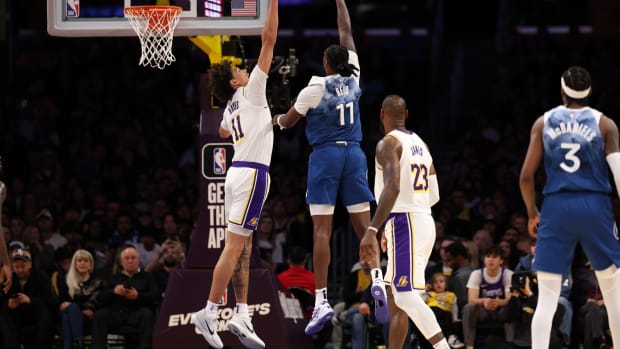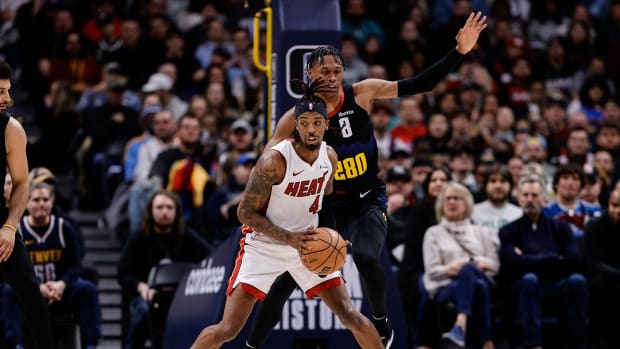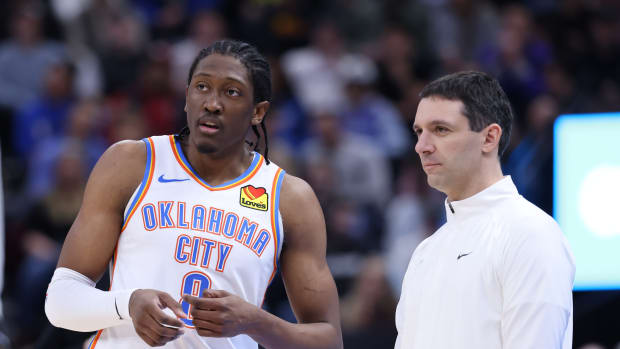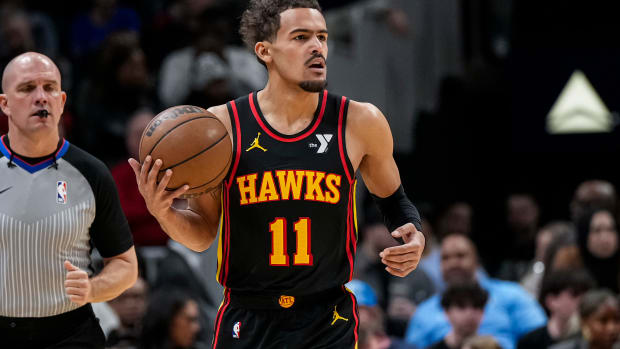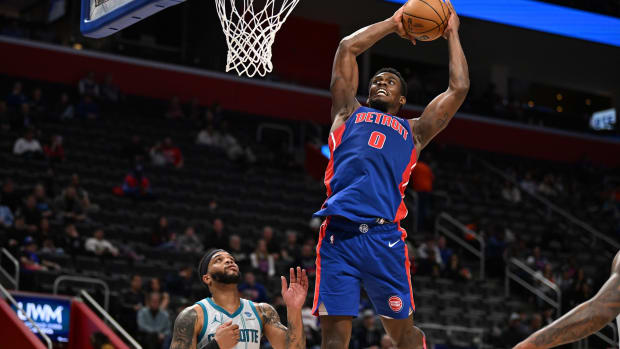The Process in the Playoffs: Taking Stock of the Sam Hinkie Experiment
There are a lot of places we could start, but let’s begin here:On June 19, 2017, Bucks owner Wes Edens sat at a podium in front of microphones and cameras and uttered this sentence: "Guys in Philly want to talk about the process, I'd rather talk about the results."
There have been a lot of takes about the Sixers in recent years, but it feels appropriate to pick on the Bucks here after the stomping they were dealt last night in Philadelphia. The Sixers went up 70–29, scored 80 in the first half and coasted to a 35-point win that punctuated their season and wrapped up the third seed in the Eastern Conference.
So let’s talk about the results. Five full regular seasons since Sam Hinkie initiated The Process, let’s take stock of what the Sixers have and have not done.
2018 NBA Playoffs: The Biggest Questions For Each First Round Series
As we have seen throughout The Process, much of this is subjective. To start with the objective:
The Sixers went 52–30 to earn the third seed in the East. They finished the season with the fifth-best record and fourth-best point differential in the NBA. They ended the regular season on a franchise-record 16-game winning streak, the longest any team in league history has ever taken into the playoffs. They are 38–12 since Christmas. They are 27–5 since Joel Embiid went to Minneapolis for the Super Bowl, watched the Eagles win a championship and then screamed into a local news camera afterward that the Sixers are next.
All that in a scant 10 months since the owner of a fellow NBA franchise felt it was apt to mock The Process.
In fairness, though, we must also talk about what the Sixers have not done yet. The literal answer to that question is obvious—the Sixers have not yet won a playoff game, let alone a series—but the debate about how we should measure the success of this franchise and the process they’ve undertaken to get there continues to rage on.
In October I wrote a piece very subtly titled, “Why I Won’t Shut Up About Sam Hinkie” in which I wrote:
But as much as Hinkie and his disciples want to talk about a process, many people out there still live in an outcomes-based world. They keep pointing to the win-loss record and the unproven young players as they clutch their “I’ll believe it when I see it” pearls tightly.
It’s a strange juxtaposition: I sit here thinking we've already been proven right—look how much potential the Sixers have on this roster!—while others wait to point and laugh that we'll soon be proven wrong once again.
This remains true, although I think more of those pearl-clutchers must be coming closer to seeing the light. Others who may be more dug in have already begun moving some of the goalposts. Scroll through my recent Twitter mentions and you’ll see people claiming—despite evidence of some actual accomplishments—that The Process still wasn’t worth what the Sixers have now because it was so embarrassing, that any team could do what the Sixers have done if they wanted to, that the Sixers’ rebuild wasn’t even that impressive because they missed on some of their draft picks and this curious trend where people now overstate the number of years the team actually tanked.
So let’s consider this outcomes-based world of ours. There are a few ways to measure success, but many sports fans still see it as championship or bust for validation of their fandom investment. And there will definitely be some onlookers who will refuse to admit the success of Hinkie’s Process unless it ends with a ticker tape parade down Broad Street.
But very few teams win titles. Eight in the last 19 NBA seasons, to be exact. Ten in the last 34. That’s a lot of fan bases waiting on that ultimate validation, coming up empty and then having new babies to disappoint.
So let’s take another step back, acknowledge that the Sixers haven’t come close to the ultimate end goal and take stock of what they have done. This time, instead of simply looking at what the Sixers did this year, let’s compare it to what the average franchise has done since this era of Sixers basketball began. People accuse the Sixers of throwing away a few years, but how much did they really throw away?
Their current accomplishments include a No. 3 seed and a 52-win season. While I won’t overstate the magnificence of a single season at that level, those can be tough benchmarks to reach for most teams in a given season. (Precisely the reason the Sixers underwent a radical plan in an effort to leap into the upper echelon in the first place.)
Just as we often see elite players and teams win clusters of championships, the top three seeds are also frequently hogged by the same handful of contenders year after after. The Sixers weren’t competitive for a four-year stretch, but a relatively small number of teams made honest runs at the title over that span. If we look at the teams that earned a Top 3 seed at any point during that four-year run, just 12 different franchises grabbed those 24 available spots.
Top 3 seeds:
East
Cleveland 3
Toronto 3
Miami 2
Atlanta
Boston
Chicago
Indiana
West
Golden State 3
San Antonio 3
Houston 2
L.A. Clippers 2
Oklahoma City 2
In that same span there have been 13 teams to win 52+ in a season:
52-win NBA seasons:
San Antonio: 4
Golden State: 3
Houston: 3
L.A. Clippers: 3
Cleveland: 2
Oklahoma City: 2
Atlanta
Boston
Indiana
Memphis
Miami
Portland
Toronto
The Sixers reached a higher peak this season than more than half of the league was able to over their whole controversial timeline.
While it’s possible these Sixers will go down as a one-year aberration like the 2014–2015 Hawks listed above, who hit their peak but couldn’t sustain it, they appear much more likely to be in that camp of perennial contenders. The key point: The fan bases absent from the lists above who wouldn’t take that trade-off are few and far between.
But now we’re wading into subjective territory, so just as we began by looking at what the Sixers have accomplished objectively, we can also draw some inferences and form opinions.
The Sixers have proven that Joel Embiid and Ben Simmons can be a formidable 1–2 punch on the court together. They have developed Dario Saric and Robert Covington into reliable and important players. They have preserved cap space and shown free agents that the fans have come back to support the team in full force. They have gotten Markelle Fultz back on the court and seen flashes of his talent, even though he is clearly a work in progress. They have run an offense where elite shooters can find opportunities to thrive. They have established themselves as Eastern Conference contenders.
All that said—cold water alert—the Sixers probably won’t win the title this year. Not just because Joel Embiid has missed the last eight games and has an uncertain status for Game 1. But because they are probably a year ahead of schedule, and it’s really hard to win 16 playoff games when you’ve never been there before. Plus, some of the other teams out there are not just experienced, but deep and star-studded too.
With the slate wiped clean for 16 playoff entrants, the Sixers will now face new experiences, new expectations, and more pressure, against coaches who will get a full series to game plan against them and make adjustments. They are likely to win a few games along the way, but equally likely to finish the season with a loss.
But here we come back to that central point, about how much the results matter. Because no matter the end result, this season has been a success. Whether they beat the Heat and Celtics to sneak into the Conference Finals, or they lose in five to Miami, this year has been an almost preposterous leap forward.
The Crossover's 2018 NBA Awards: A Rookie of the Year Battle for the Ages
Sam Hinkie did not promise a dynasty, or even a single championship. What he promised was the opportunity to compete for championships, and the Sixers will have that moving forward no matter how the next month or two play out.
The most devout Hinkie followers already feel we have been proven right—now more strongly than ever. The Sixers went from mediocrity to contender, seemingly overnight. (In truth it took a few years and there were a lot of losses along the way.) They have an enthused fan base on the doorstep of a playoff run, and every reason to think they’ll keep coming back for as long as this young core stays together.
But for many others looking on, the team is still in need of those greater accomplishments in order to show more definitively not just what they can do but what they have done. And if and when that day comes, those who have trusted The Process all along will gladly point to the results as well.































